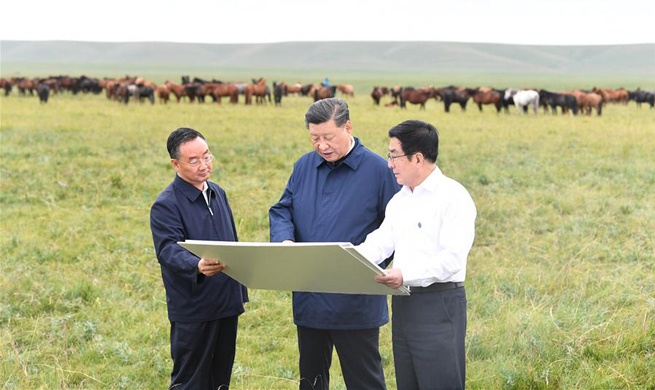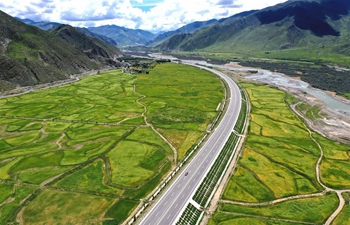BERLIN, Aug. 22 (Xinhua) -- After two consecutive extreme summers, the effects of drought and aridity in Germany were becoming increasingly severe, according to a drought report published by WWF Germany in Berlin on Thursday.
"In Europe, weather extremes are becoming more and more probable due to global warming and are increasingly endangering energy supplies or the cultivation of staple foods such as potatoes, wheat and maize," according to the WWF report.
The Helmholtz Center for Environmental Research (UFZ) Drought Monitor showed that Germany's soils were still suffering greatly from the consequences of the extreme drought of 2018.
According to the UFZ monitor, there was an "extraordinary drought" in northern Germany, which was the driest class in soil moisture measurement.
In the weather records of the German meteorological service (DWD), the drought year 2018 was without precedent.
In eight of the last 12 months, the average monthly precipitation of the DWD showed that it was much drier in Germany than the long-term average.
In July, for example, only 55 liters per square meter fell on average, while the long-term average precipitation was 78 liters, according to the German meteorological service.
Last year, Germany had a record number of hot days with temperatures over 30 degrees Celsius as well as summer days when temperatures exceeded 25 degrees Celsius, the DWD data showed.
This had significant effects on German agriculture as grain harvests fell 16 percent to 34.5 million tons compared to the previous year while the potato harvest dropped to "an all-time low" of 8.7 million tons, according to the WWF report.
"Droughts threaten the livelihoods of millions of farmers worldwide and increasingly also in Germany," said Philipp Wagnitz, Director of Ecosystems & Resources at WWF Germany.
Last year, the German Farmers' Association (DBV) estimated the total damage of the droughts to farmers at around 2.5 billion euros (2.77 billion U.S. dollars).
At the same time, "the after-effects of last year's drought are still clearly evident" and the German Farmers' Association had lowered its estimates for the grain harvest to below the 47-million-ton average, noted the WWF report.
Droughts affected around 55 million people around the world each year while around 370 million people worldwide lived in drought risk areas, according to the WWF report.
"Droughts destroy important ecosystems and endanger food security. They fuel social unrest and conflict," said Wagnitz.
Droughts also endangered energy supplies which were heavily dependent on water. Almost half of the world's thermal power was "produced in areas with a high risk of drought", the WWF said.
"If the water level is too low or the cooling water too warm, power plants can reduce their output or be shut down," said WWF water stewardship officer Juliane Vatter.
In July, the WWF had called on the European Union (EU) to adopt a more sustainable approach to fresh water, stressing that the member states would have to act "as long as natural water resources could still be saved".
"Even in Northern European countries, bottlenecks in freshwater supplies are becoming apparent today," warned the WWF.













